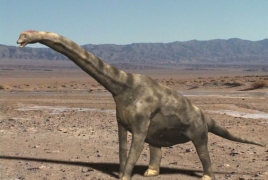
Rocks from the most pivotal moment in Earth's history were discovered offshore of the Yucatan Peninsula, according to a study released Monday, September 10, USA Today reports.
The finding is "the most detailed look yet into the aftermath of the catastrophe that ended the Age of Dinosaurs," said study lead author Sean Gulick, a research professor at the University of Texas Institute for Geophysics.
When the asteroid smashed into the Earth 66 million years ago, the impact ignited wildfires, triggered tsunamis and blasted so much sulfur into the atmosphere that it blotted out the sun, which caused the global cooling that killed off the dinosaurs.
The study found hard evidence of this scenario in the hundreds of feet of rocks that filled the impact crater within the first 24 hours after the strike.
"It's an expanded record of events that we were able to recover from within 'ground zero,' " said Gulick, who co-led a scientific drilling mission that retrieved the rocks from the impact site in 2016. "It tells us about impact processes from an eyewitness location."
Scientists found melted and broken rocks such as sandstone, limestone and granite – but no sulfur-bearing minerals, despite the area's high concentration of sulfur-containing rocks. This finding suggests that the impact vaporized these rocks, forming sulfate aerosols in the atmosphere and causing cooling on the global scale.
Researchers estimate the asteroid hit with the equivalent power of 10 billion atomic bombs of the size used in World War II. The blast ignited trees and plants that were thousands of miles away and triggered a massive tsunami that reached as far inland as Illinois.

